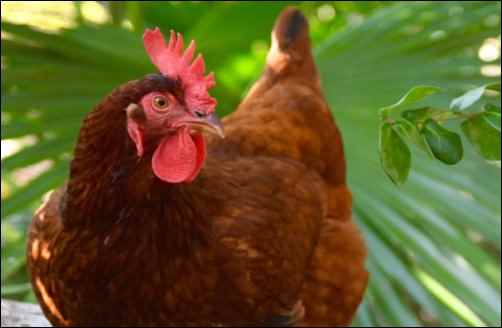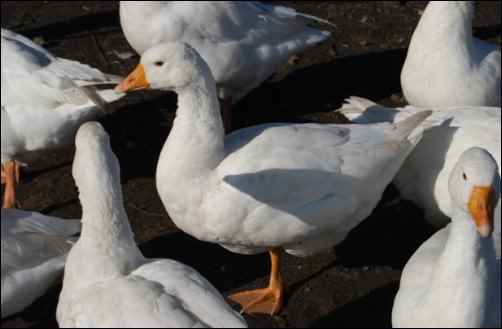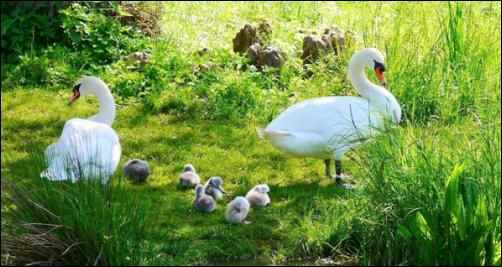Whether you want eggs, meat, or your own petting zoo, there’s a bird that will fill the bill. There is plenty of poultry to pick from when you’re trying to choose the best poultry for your homestead. Chickens are very popular, and for good reason. They’re great for fresh eggs, may be processed for meat, and there’s nothing like the sound of a rooster crowing in the morning! However, chickens aren’t the only bird in town. Common poultry kept on homesteads include:
- Chickens
- Ducks
- Turkeys
- Geese
- Guinea fowl
- Pigeons
- Ornamental & Game birds

What Do You Want from Your Flock?
There are many reasons for keeping poultry. Do you just want a few hens for eggs or are you starting a homestead business? People commonly keep poultry for the following:
- Eggs
- Meat
- Pets
- Pest Control
- Weeding
- Hobby Farm or Homestead Business
- Conservation or Game Farm
Some areas have a market for products such as multi-colored or specialty eggs. Young poultry may be sold locally or raised for competition. Ornamental feathers and hatching eggs may be sold online and shipped. Perhaps you want to raise your own meat for the freezer. Some homesteaders wish to conserve heritage breeds or raise game birds for release (check regulations). Guinea fowl control ticks and geese do a great job of weeding. Maybe you just want pets or living lawn ornaments. No matter what your reason for wanting poultry, it’s a good idea to start out small and add to your flock as you gain experience.

Caring for Your Flock
Prepare a spot for your new birds before they arrive. If you order chicks, make sure you have a warm protected brooder. Adult birds should be protected overnight to prevent predation. Ventilate their coop properly to prevent build up of ammonia, which can lead to respiratory problems. Allow plenty of room for birds to roost comfortably and move around the pen freely. Crowded conditions cause stress.
Supply clean water and fresh feed daily for a healthy flock. Ducks and geese need a pan of water deep enough to dunk their heads to prevent eye infections. Vitamins in ground feed break down quickly in heat and can cause vitamin deficiencies. Store feed in a dry, rodent proof container. Do not use feed that is moldy or rancid because it can make birds sick.
Keeping different species together may lead to problems with disease and fighting. For example, chickens can carry parasites that cause blackhead disease in turkeys. Larger birds may injure smaller birds, especially with too many males present. Although it is possible to keep a mixed flock, it is recommended that you keep each species separately until you’ve had plenty of experience.
Birds of different species, ages, and breeds may require specific feed formulas. Those grown for meat require higher protein and carbohydrate ratios than birds raised for laying. Free range or pastured poultry need less feed overall and lower concentrations of vitamins and minerals, as they will forage for much of their nutritional needs.
Percentage of Protein Needed, by Species
| Species | Day Old | Grow Out | Layer/Finisher |
| Laying Hens | 18-20% | 16-18% | 16-18% |
| Meat Chickens | 20-24% | 20-24% | 18-20% |
| Ducks | 18-20% | 16-18% | 16% |
| Geese | 20-22% | 15-18% | 15-18% |
| Turkeys | 24-28% | 21-24% | 16-22% |
| Guinea Fowl | 24-26% | 18-20% | 16% |
| Game Birds | 24-28% | 18-24% | 18-19% |
Species of Poultry
Day-old poultry are readily available through mail-order hatcheries. They can be costly and many homesteaders go a little crazy on their first order. Be realistic about the time and energy you can expend on your flock and don’t forget to figure in feed costs! Choose the species that best fit your needs and space.

Chickens
There are breeds of chicken for just about any purpose. Some are excellent egg layers, others are great for meat production, and some heritage breeds make good dual purpose birds. There are active foragers, dedicated mothers, and unusual breeds for showing. Bantams (pint size chickens) and docile breeds make good pets and can be kept in smaller spaces. Most chickens enjoy foraging. Fancy feathers, colorful eggs, home raised meat, chicks and point-of-lay pullets may be sold.
Notes About Hybrids:
Hybrids are a cross of more than one breed, producing offspring with certain advantages. Breeding them is possible, but you won’t get the same traits in the next generation.
The Cornish Rock hybrid is a fast-growing bird that reaches butchering size in about 8 weeks. They are not bred for egg production.

Sex Link Hybrids are crosses that produce males and females with different colors or markings. These hybrids are excellent layers and ordering pullets (young females) reduces overall cost, increases egg production, and provides eggs earlier than a flock of heritage breeds.
| Chicken Breed | Eggs | Meat | Pet | Broody | Forages | Hobby |
| Cornish Rock Hybrid | P | X | P | P | P | Meat Sales |
| Sex Link Hybrids | X | P | F | P | F | Egg Sales |
| White Leghorn | X | P | F | P | G | Egg Sales |
| Rhode Island Red | X | F | F | F | G | Egg Sales |
| Plymouth Barred Rock | G | G | F | F | G | Feathers for fly tying |
| Easter Egger/ Ameraucana | F | P | G | F | X | Colored Eggs |
| Black Copper Maran | F | F | F | X | F | “Chocolate” Eggs |
| Buff Orpington | F | F | G | G | F | |
| Sussex | G | F | X | G | F | |
| Welsummer | F | F | F | F | F | Reddish-brown Eggs |
X – Excellent G – Good F – Fair P- Poor

Ducks
Ducks are entertaining to watch, but can be very messy. Some breeds and hybrids are great egg layers, some are best for meat. Ducks lay well even in winter and their eggs are excellent for use in baked goods. Ducklings are susceptible to leg deformities if vitamin E intake is insufficient, but otherwise ducks are hardy and fairly disease resistant.
| Duck Breed | Eggs | Meat | Pet | Broody | Foraging | Hobby |
| White Pekin | G | X | G | P | F | Meat Sales |
| Khaki Campbell | X | F | F | P | F | Egg Sales |
| Indian Runner Ducks | X | F | F | P | G | Ducklings |
|
Muscovy* |
P | X | F | X | X | Meat Sales |
X – Excellent G – Good F – Fair P – Poor *Check regulations in your area

Turkeys
Turkeys are great birds for rustling up some of their own grub and providing meat for your table. They lay eggs seasonally and can be costly to feed through the winter. Broad Breasted turkeys are the gold standard for meat turkeys, and reach butchering weight in 3 – 4 months. However they cannot mate naturally. The heritage breeds are great for raising the next generation each year, but have less breast meat. To keep turkeys in a pasture cover it with netting, or clip one wing. Turkeys aren’t generally kept as pets but they are enjoyable to watch, especially the Royal Palm turkey with its beautiful plumage. In the right area, you may be able to sell fertile hatching eggs, young birds, or adult breeding pairs to help cover expenses.
| Turkey Breed | Meat | Broody | Foraging | Hobby |
| Broad Breasted White
Broad Breasted Bronze |
X | P | F | Meat Sales |
| Bourbon Red | G | G | X | Poult Sales |
| Narragansett | G | G | X | Poult Sales |
| Royal Palm | F | G | G | Poult Sales, Ornamental |
X – Excellent G – Good F – Fair P – Poor

Geese
Geese are great foragers and some breeds are good for roasting. They lay eggs seasonally, so their eggs are more valuable for raising goslings than for making your omelets. Geese can be aggressive and will chase off intruders, maybe even the neighbors. Be careful with young children around ganders protecting their family. Extra goslings, fertile eggs, meat birds, and breeding pairs may be sold to help cover expenses.
| Goose Breed | Meat | Eggs | Broody | Hobby Farm |
| Pilgrim | G | P | F | |
| Chinese | G | G | F | Gosling and Egg Sales |
| Embden | X | G | F | Meat Sales |
X – Excellent G – Good F – Fair P – Poor

Guinea Fowl
Guinea fowl make a horrible racket when threatened, which can be a blessing or a curse. If you have problems with predators they will alert the flock to danger, but they may drive you crazy in the process! Guineas often hatch their own young, but aren’t very attentive mothers. Their meat resembles that of wild game birds. They are excellent foragers and pest control for the homestead, eating ticks and insects. Unlike chickens, Guineas aren’t destructive in gardens. They are very flighty birds and require a net over their pen if they must be contained. Extra keets, eggs, breeding pairs, feathers, and meat may be sold.
| Breed | Meat | Eggs | Broody | Foraging | Hobby |
| Helmeted Guinea | G | F | F – not a good mother | F | Sale of eggs, meat, keets, adults
Pearl Guinea – feathers |
| Crested Guinea | G | F | F – not a good mother | X | Sale of eggs, meat, keets, adults |
| Vulturine
(not cold hardy) |
X | F | F – not a good mother | X | Sale of eggs, meat, keets, adults |
X – Excellent G – Good F – Fair P – Poor
Pigeons
Pigeons can be raised for racing, show, or for meat. Although a young squab doesn’t have a lot of meat, they are sought after in some markets. They may be kept in a dove cote and allowed to find their own food and water for a low maintenance flock. Managed this way, they need very little care and are a good option if you travel often. Hatchlings require a great deal of care and pigeon “milk,” so it is preferable to allow the parents to raise them. The offspring may be used for your own meals or they can be sold in specialty markets.
|
|
Meat | Broody | Foraging | Hobby |
| Pigeons | F | X | X | Showing, racing, squab |
X – Excellent G – Good F – Fair P – Poor
Game Birds
Game birds, such as quail, pheasant, and partridge, may be raised for their meat, eggs, ornamental feathers, or for game farms and conservation. Check for regulations in your state before ordering.

Feed day-old birds a very finely ground game bird ration to start them. They are very small and can escape from brooders made with chicken wire. Make sure your brooder is constructed properly and birds are not crowded or kept in stressful conditions to prevent problems with cannibalism and high death rates.
| Species | Meat | Eggs | Broody | Foraging | Hobby |
| Pheasant | G | P | V | X | Sale of feathers, meat, chicks, adults.
Game/Hunting |
| Quail | G | G | P | G | Sale of eggs, meat, chicks, adults
Game/Hunting |
| Partridge | G | P | V | G | Sale of meat, chicks, adults, Game/Hunting |
X – Excellent G – Good F – Fair P – Poor V – Varies

Keeping Ornamental Birds
Not all poultry are kept for meat and eggs. Swans may be kept on small lakes and ponds to help keep geese from fouling the water. Peacocks are beautiful to watch and their ornamental feathers may be collected and sold. Some rare or unusual breeds of chicken are kept purely for enjoyment.
| Species | Eggs | Broody | Foraging | Hobby |
| Swan | P | X | X | Sell cygnets or adult swans |
| Peafowl | P | P | F | Sell feathers, chicks or adults |
| Ornamental Chickens | V | V | V | Sell hatching eggs, chicks, adults, ornamental feathers |
X – Excellent G – Good F – Fair P – Poor V – Varies

Swans
Swans may look beautiful on your pond or lake, but are very aggressive when protecting their mate and young (cygnets). Only one pair of swans may be kept on a pond or small lake and they may kill other species of waterfowl during mating season. They forage for much of their food in a natural setting, but will set off in search of food if their pond is not sufficient. Many states have regulations against keeping swans, so check before you buy. These birds are very expensive and may be difficult to locate and purchase.
Peafowl
Peafowl are an ornamental species that you may need a permit to raise. Fertile eggs may be sold or incubated and young peafowl sold to help cover expenses. Peacock’s feathers are sought after for crafts and floral arrangements. They can be rather noisy and need a clean pen to prevent damaging their tail feathers. Expect to pay a handsome price for these birds.

Rare and Unusual Chicken Breeds
Some breeds of chicken are fun to keep just for their ornamental value. They will lay eggs but usually aren’t very productive. Instead of scrambling them, hatch fertile eggs and sell or show the offspring. This can be a very rewarding hobby or 4H project!

What Poultry Will You Raise?
If you are having a tough time deciding, don’t feel too bad. Most homesteaders do! Here are some things to consider as you leaf through the hatchery catalogs.
- How much space do you have?
- Will all of your poultry end up as pets, or will you process some for meat?
- Is the proper feed available and affordable in your area?
- Do you have predators?
- Will neighbors object to the noise?
- Do you wish to raise heritage poultry or hybrids?
- Do you have time, energy, and patience for just a few birds or many?
- Will you have someone to care for them if you go out of town?
As you take stock of your poultry needs and dreams, be practical. Will you be able to care for them every day or will they need to be more self-sufficient? Would a flock of dual-purpose heritage chickens provide you with enough meat and eggs or would a flock of “egg-laying machines” and a batch of hybrid meat chickens suit your needs?
If you plan to start up a small business selling eggs, meat, extra poultry, feathers, or other goods, assess the market in your area. Check for regulations on sales of eggs, meat, and game birds. Are there laws about proper labeling? Some areas will not allow the sale of home-raised meat unless it is processed at a USDA-inspected facility and that can get pricey. Selling eggs at a farmers market or to local chefs may require a refrigerated truck. Be sure to look into the details of running a home business before sinking your hard-earned dollars into a large order of chicks. Dip your toe in with a small flock first and see how things go before you do a swan dive into a homestead business. Do your research and don’t be a bird brain!
This is not intended as an in-depth guide to raising poultry. It is intended as a primer to help decide which species best fits your needs.
~~~~~~~~
Lisa Lombardo is the owner of The Self-Sufficient HomeAcre.


